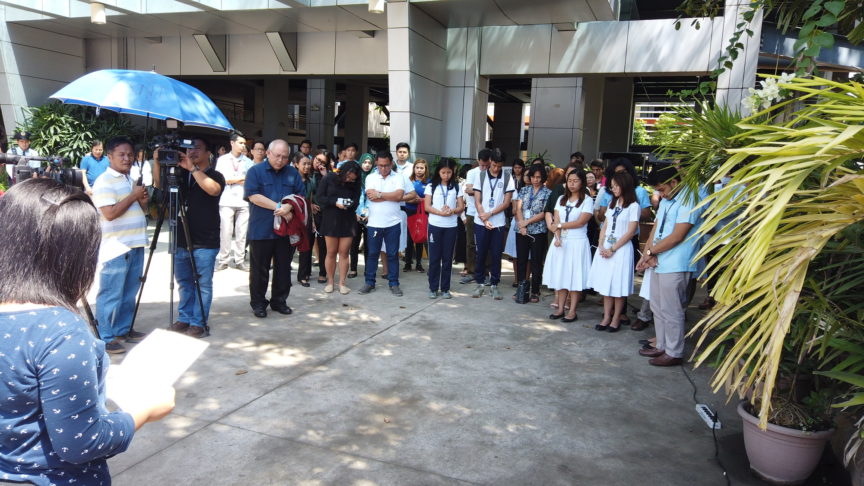 Students of the Ateneo de Davao University join the prayer rally in support of the Bangsamoro Law ratification on Monday, January 21, 2019. Photo courtesy of Rudolph Ian Alama of PIA 11
Students of the Ateneo de Davao University join the prayer rally in support of the Bangsamoro Law ratification on Monday, January 21, 2019. Photo courtesy of Rudolph Ian Alama of PIA 11
DAVAO CITY (MindaNews/ 21 January) – Ateneo de Davao University (ADDU) president Fr. Joel Tabora, SJ, on Monday expressed hopes the “forces for peace and social justice” will prevail as the Bangsamoro people cast their votes for the ratification of the Organic Law for the Bangsamoro Autonomous Region in Muslim Mindanao (OLBARMM) on Monday.
The ratification of OLBARMM, the enabling mechanism of the 2014 Comprehensive Agreement on the Bangsamoro, will pave the way for the creation of a new Bangsamoro government that will replace the Autonomous Region in Muslim Mindanao (ARMM).
In an interview after the prayer rally dubbed “PossiBOL: Prayer for Peace,” Tabora told reporters that the blasts that rocked Cotabato City a day before the plebiscite were unfortunate.
He urged the people to continue to hope and pray that the “forces that are for peace, forces that are for social justice will prevail over these forces that are disruptive and violent.”
He said they respect the position of some sectors opposing the ratification of the law but maintained they will support the “will of the majority, the will of the Bangsamoro people.”
“Our appeal is the appeal of youth that we finally come to a point where we stop fighting one another, we stop killing one another and that we allow a process that is democratic to take effect. Everybody has been allowed to vote, but whichever way the vote goes we hope that it will be accepted by all,” he said.
Some students of ADDU joined a candle lighting activity held in support of the OLBARMM plebiscite.
Tabora said he hopes the Moro people in Mindanao will be united if the OLBARMM gets ratified.
“We hope that through the ratification of the Bangsamoro Organic Law, the Muslim community will come together as a stronger community. We hope that through the various means that are provided by the law — the financial means — that the area will be able to recover from its being behind as far as national wealth is concerned,” he said.
He said they envision a peaceful tomorrow and not violence for the future Bangsamoro.
“This is possible only with the acceptance of diversity, with the acceptance that we have to begin to recognize and respect one another as different and yet come together as one nation,” he said.
“We hope that through the structures of self-determination, the Bangsamoro people will take responsibility for their own society, and take responsibility for peace and for a bright future for future generations,” he said.
The Commission on Elections (Comelec) has scheduled two separate dates for the plebiscite of OLBARMM. January 21 is for the voters in the five provinces and two cities in the ARMM as well as Cotabato City and Isabela City in Basilan, and February 6 for the province of Lanao del Norte, except Iligan City; the municipalities of Aleosan, Carmen, Kabacan, Midsayap, Pikit, and Pigkawayan in North Cotabato; and all other areas whose petitions for inclusion in the future BARMM were approved by the Comelec.
Tabora urged academic institutions in Mindanao to make a shared contribution to the development of the future Bangsamoro and help it overcome poverty.
“We would very much like to be able to contribute to development of the Bangsamoro in a way that the Bangsamoro people themselves wish us to help. We have certain strengths, we have certain things that we think that we can offer but we would like the Bangsmaoro people themselves through its representatives to invite us to participate here,” he said.
He said the schools can help through education, creation of civil service arm, and development of the business and entrepreneurship skills of the young Moro people. (Antonio L. Colina IV/MindaNews)
